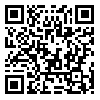BibTeX | RIS | EndNote | Medlars | ProCite | Reference Manager | RefWorks
Send citation to:
URL: http://journal.bums.ac.ir/article-1-1242-en.html

 , Jamshid Jamali2
, Jamshid Jamali2 
 , Alireza Heidari-Bakavoli3
, Alireza Heidari-Bakavoli3 
 , Mohammad Tayyebi3
, Mohammad Tayyebi3 
 , Hossein Nazari Hyanlo4
, Hossein Nazari Hyanlo4 
 , Mohammad Taghi Shakeri *5
, Mohammad Taghi Shakeri *5 

2- Department of Biostatistics, School of Medicine, Shiraz University of Medical Sciences, Shiraz, Iran
3- Department of Cardiology, Faculty of Medicine, Mashhad University of Medical Sciences, Mashhad, Iran
4- Mashhad University of Medical Sciences, Mashhad University of Medical Science, Mashhad, Iran
5- Department of Biostatistics, Faculty of Health, Mashhad University of Medical Sciences, Mashhad, Iran ,
Materials and Methods: In this cross-sectional study 65 patients with implanted cardioverter defibrillator were included to prevent their undue death. Before the implantation, QRS duration in the surface ECG was measured and recorded. Furthermore, variables such as age, gender, indication for ICD implantation, family history of sudden cardiac death, and QTc interval before ICD implantation were recorded. During follow-up visits of the patients, ICDs were interrogated and appropriate and inappropriate therapies were traced. Finally logistic regression in SPSS statistical software (V: 11.5) was used for data analysis.
Results: Mean age of the patients was 17.208±47.92 years. Eighteen patients (27.7%) were females and 58 (89.2%) had a family history of sudden cardiac death. Mean QRS duration and QTc interval were 36.78 ± 117.94 msec and 62.42±466.97 msec, respectively. There was no statistically significant relationship between QRS duration and status of appropriate and inappropriate ICD shocks. Among the studied parameters, there was only a significant relationship between status of appropriate or inappropriate ICD shocks and the different manufacturers of ICD devices.
Conclusion: QRS duration does not have a significant relationship with status of appropriate and inappropriate ICD shocks. This may not predict arrhythmic events in ICD patients.
Received: 2012/09/17 | Accepted: 2013/05/14 | ePublished: 2016/03/10
| Rights and permissions | |
 |
This work is licensed under a Creative Commons Attribution-NonCommercial 4.0 International License. |



